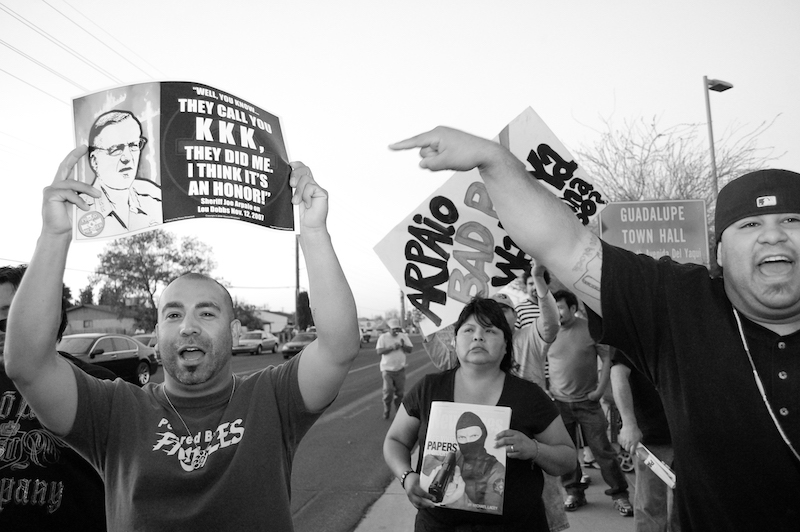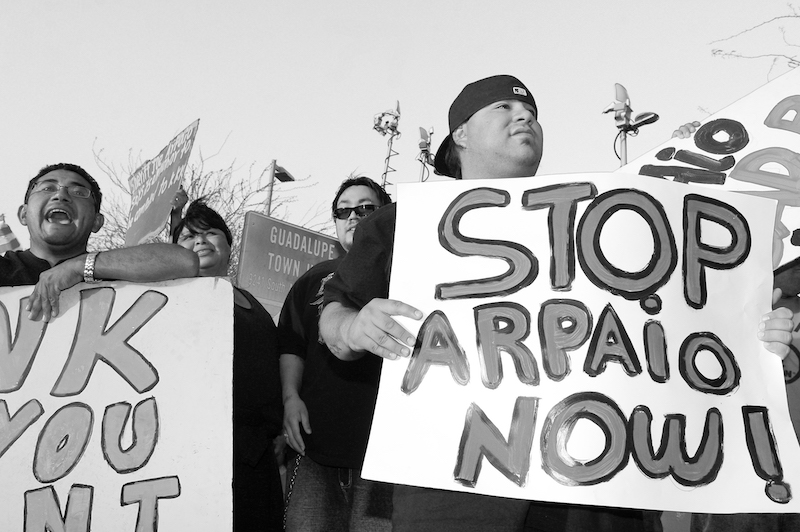(Guadalupe, Arizona) — Organizers and residents from the Town of Guadalupe are turning negative experiences with the agency in charge of their law enforcement into a positive effort to look for options to maintain dignity and respect for their community.
With a set goal “to better understand the changing immigration issues as it relates to law enforcement,” members of the Guadalupe Public Safety Committee recently invited several community organizations to speak to residents and business owners about civil rights and liberties. The meeting took place in the Our Lady of Guadalupe Church.
Related → A Short History of South Phoenix from 1865 to the early 1930s
At least 70 people attended the June 25, 2008 meeting to listen to a panel of experts invited by the committee. The panel was composed by members of various organizations, a government agency and a Spanish radio station.
Representatives from the American Civil Liberties Union, the Anti-Defamation League, the Equal Employment Opportunity Commission, Respect/Respeto, Tonatierra, KSUN 1190 AM, NAACP, and Los Abogados, shared relevant information to attendees, who had the opportunity to present testimonials and ask the panel questions.
Due to a growing concern about how the MCSO was conducting law enforcement in Guadalupe, the committee was founded and began working in October of 2007. A partnered effort, the committee brings individuals together from various organizations, including Our Lady of Guadalupe Church, Centro de Amistad, Valley Interfaith Project, as well as private citizens from the community.
Committee members set to the task of obtaining information on the interaction between the Maricopa County Sheriff Office (MCSO) —the contracted agency providing law enforcement services in the Town of Guadalupe— and residents. To achieve this goal, several meetings were conducted in homes and public locations, where citizens shared information regarding law-enforcement incidents which occurred in the community.
The committee also met with the MCSO’s Guadalupe branch officials, and with members of the Town Council. A workforce analysis of sheriff deputies assigned to Guadalupe since the year 2000 was conducted. Guadalupe’s officials received the information on the committee’s activities and progress through formal presentations.

Sheriff’s “crime suppression operation” angers Town of Guadalupe residents
As the Guadalupe Public Safety Committee began looking for ways to improve the relation between residents and the MCSO, an event triggering a more determined reaction from the community in Guadalupe unfolded the evening of April 3, when the sheriff arrived in town to carry out one of their actions theoretically dubbed as “crime suppression operations.”
In real application, these operations consist of patrolling the streets to stop motorists with the purpose of detecting people living in the country without legal documents. The sheriff then proceeds to turn suspected undocumented individuals over to Immigration and Customs Enforcement (ICE) for deportation procedures.
The operation in this town of about 6,000 residents was the third of its kind to be implemented by the MCSO consecutively. A couple of weeks prior to their arrival in Guadalupe, Maricopa’s sheriff had conducted similar actions in Central East and Northeast Phoenix, in neighborhoods predominantly populated by immigrants from Latin America.
Groups of protesters and counter-protesters gathered around the sheriff’s mobile operational centers in Phoenix, set up in public parking lots to function as provisional headquarters of the immigration sweeps. Emotions ran high during the demonstrations in Phoenix, where verbal confrontations among antagonistic groups of protesters generated a hostile environment bordering on physical violence.
The MCSO’s operation in the Town of Guadalupe prompted the town’s residents and public officials to gather in protest around the mobile command post set up in the parking lot of the Family Dollar store, located on Guadalupe Road, just east of Avenida del Yaqui.
As the numbers of protesters grew, MCSO’s personnel became virtually boxed in between the angry crowd and the store’s building. Unlike the two prior operations in Phoenix, counter-protestors did not show up in Guadalupe.
The protest reached a boiling point when Guadalupe officials criticized and confronted the head of MCSO, accusing him of coming to their town under the pretense of doing a “crime suppression operation,” when evidently the plan was to arrest undocumented people.
Guadalupe’s Mayor, Rebecca Jimenez, and Sheriff Joe Arpaio became involved in a brief, heated altercation, abruptly ending when the sheriff responded to the mayor’s request to recall the scheduled second day of operation, by assuring her his department would return the next day in “full force.”
However, on the following day —April 4— the MCSO did not set up the mobile command center as they had done the day before. The parking lot of the Family Dollar store, as well as the surrounding area, was mostly deserted of sheriff’s special vehicles and protesters. Only television channel’s trucks and MCSO’s patrol vehicles were seen around the streets of Guadalupe.
During the second day of the immigration crackdown, the sheriff department resumed their tactic of enforcing traffic violations, mostly non-moving infractions. Nevertheless, the announced “full force” was reduced to sheriff’s vehicles cruising around the streets of Guadalupe and stopping motorists. The MCSO utilized its facilities in the Maricopa County Southeast Regional Campus instead —a few miles east of Guadalupe— where they processed motorists arrested in Guadalupe.
In the aftermath of the sheriff’s operation in the Town of Guadalupe, town officials immediately moved to explore the possibility of ending the contractual relationship they had with MCSO to receive law enforcement services. Since the town lacks its own police agency, the sheriff’s department has functioned as Guadalupe’s only police since 1990, a service costing the town $1.2 million a year.
Guadalupe defines attributes law enforcement agents need to have
A month after the April 3 incident, the committee organized and held a community-wide meeting, where residents had the opportunity to participate and express their ideas on issues such as what would be the most needed service for law enforcement in Guadalupe, and the desired attributes police officers working in Guadalupe should have. Among the desired police officer’s characteristics presented by Guadalupe residents were, respect of community and religious customs; officer’s close involvement in community activities versus only patrolling the streets; and, an effort to get acquainted with citizens. In addition, the community felt the officer needs to speak both English and Spanish to interact effectively with residents. Community feedback gathered at this meeting was presented three weeks later to the Town Council.
According to the Guadalupe Public Safety Committee, no formal recommendation on what direction the town should take about the law enforcement issue has been made. But the committee has stressed several times to public officials the necessity of including the community’s input on their decisional process, as well as to keep residents informed. For the committee, Guadalupe’s residents should have an active role in deciding what they think is best for them in terms of the type of law enforcement agency they need.
Nine months since the committee was established, searching for law enforcement options is not the only change the Town of Guadalupe is seeking to make. The negative experiences in dealing with sheriff deputies — particularly after the turmoil of the MCSO’s operation on April 3— and a reportedly growing harassment from deputies patrolling their streets, Guadalupe is moving forward to increase the level of community awareness and involvement, as well as disseminating useful and contextualized information to residents.
The efforts beyond just finding professional law enforcement alternatives sensitive to Guadalupe’s cultural and demographic identity have resulted in constructive improvements, such as educating and informing residents about civil rights and liberties. The town’s pursuit to be served and protected by a law enforcement body respectful to its traditions, culture, religion and peculiar demographic challenges is resulting in a growing opportunity to empower the people within, as well as to promote understanding of the people living in other bigger surrounding cities.
© 2008 - 2025, Eduardo Barraza. All rights reserved.





